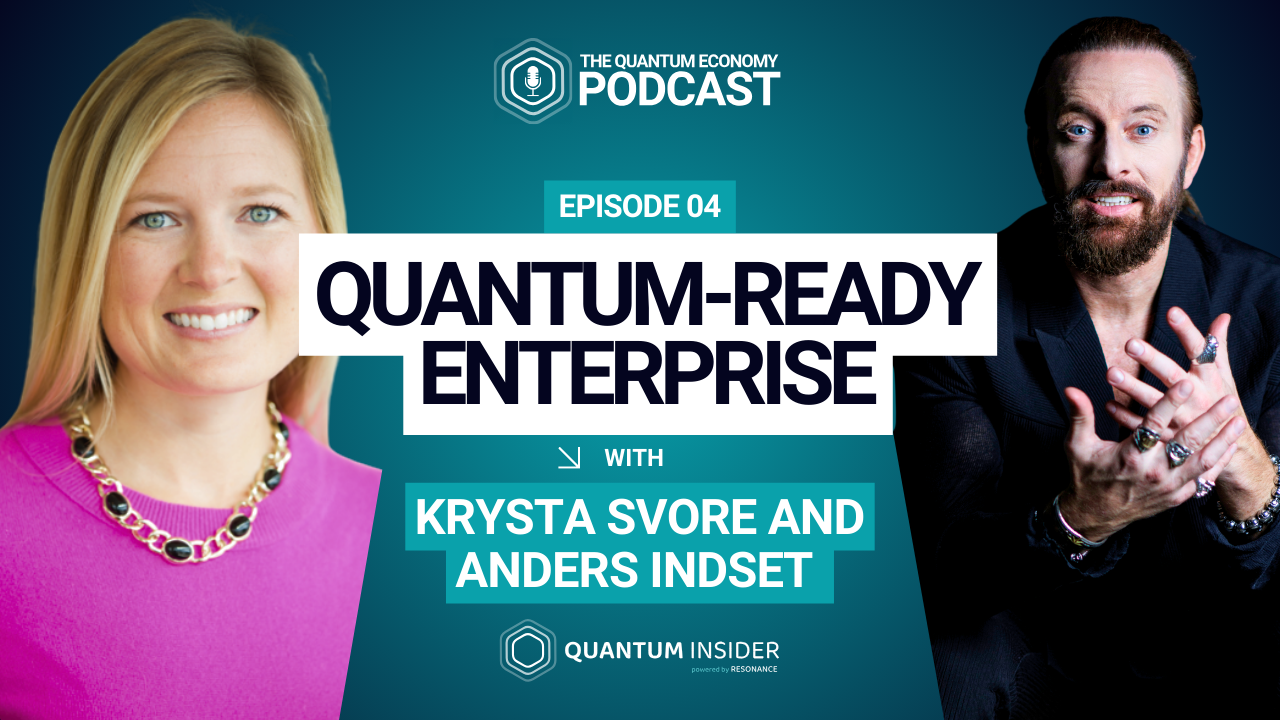Insider Brief:
- Krysta Svore explains that being “quantum-ready” means acting now—implementing post-quantum cryptography, securing data, and preparing infrastructure for scalable machines.
- She highlights how progress comes from uniting research and engineering, where each advance in qubits, error correction, and control software uncovers new applications and challenges.
- Svore emphasizes that quantum readiness also requires responsible innovation, with human-centered values guiding the development and deployment of powerful technologies.
- Together with Anders Indset, she reflects on the broader philosophical questions of computation, creativity, and human agency in an age of intelligent machines.
In this week’s episode of The Quantum Economy Podcast, host Anders Indset is joined by Dr. Krysta Svore, Technical Fellow and Vice President of Advanced Quantum Development at Microsoft Azure Quantum, for a conversation on what it means for enterprises and societies to be truly “quantum-ready.” As one of the leaders driving Microsoft’s full-stack quantum ecosystem, Svore brings both technical expertise and strategic perspective.
Svore frames quantum readiness as more than preparing for eventual hardware advancements—it is about building systems, strategies, and safeguards today. She points to post-quantum cryptography as an urgent priority, noting how Microsoft is integrating new standards to secure trust and data integrity against emerging threats. Beyond security, readiness also requires alignment with the infrastructure of scalable quantum machines, from breakthroughs in hardware and error correction to the design of logical qubits that can sustain reliability at scale.
The discussion also speaks to the importance of bridging research and engineering. For Svore, progress does not come from theory alone but from the continuous interplay between scientific insight and real-world system design. Each step forward in error correction, qubit architecture, or control software reveals new use cases and fresh challenges, an iterative cycle that is building the foundation for a usable quantum future.
Yet readiness is not only a technical question. Svore stresses the need for responsible innovation and human-centered values as the field scales. Alongside Indset, she explores deeper themes of computation, creativity, and human agency in an era of intelligent machines. Quantum computers may generate new forms of knowledge, but it is people who must guide discovery, ethics, and purpose.
The episode touches on:
- Post-quantum cryptography as a strategic priority for enterprises and governments
- The path from qubits to systems through error correction and logical qubit design
- Why bridging research and engineering is central to making quantum usable
- The ethical imperatives of scale and responsible innovation
- A broader reflection on computation, creativity, and what it means to be human in a quantum era
Listen and Learn
You can access this episode of The Quantum Economy Podcast on all major platforms:
- Listen on Spotify
- Listen on Apple Podcasts
- Listen on YouTube
New episodes of The Quantum Economy Podcast will be featured on The Quantum Insider. As quantum technologies evolve alongside other exponential fields, thoughtful engagement with the broader questions they raise on design, governance, value, and responsibility remains essential.
About the Host
Anders Indset is a Norwegian-born business thinker and investor known for bringing together philosophy and emerging technology. He is the author of The Quantum Economy, a book that examines how the logic of quantum computing, its uncertainty, entanglement, and probabilistic nature, can be applied to institutions and economies facing complexity and rapid change. His framework, Triangular Alchemy, proposes a new approach to organizational leadership in exponential times: balancing innovation (Forge), efficiency (Optimize), and investment (Scale) through anticipatory governance. His new book, The Singularity Paradox: Bridging the Gap Between Humanity and AI, is available now.
The podcast draws on this background while integrating real-time insights from global practitioners. It is not a promotional platform, but a curated forum for meaningful dialogue around technological transformation and human responsibility.




0 Comments